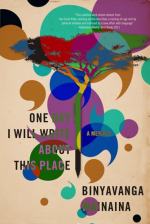|
This section contains 461 words (approx. 2 pages at 400 words per page) |

|
One Day I Will Write About This Place Summary & Study Guide Description
One Day I Will Write About This Place Summary & Study Guide includes comprehensive information and analysis to help you understand the book. This study guide contains the following sections:
This detailed literature summary also contains Topics for Discussion on One Day I Will Write About This Place by Binyavanga Wainaina.
The following version of the novel was used to create this study guide: Wainaina, Binyavanga. One Day I Will Write About This Place. Graywolf Press, July 19, 2011. Kindle Edition.
Binyavanga Wainaina knew he was different from other people even when he was a young child. His memoir, One Day I Will Write About This Place, tells the story of his search for his place in the world. He describes his struggles to come to terms with his desire to write and overcome his fear that he will not succeed. Along with a discussion of his own life, Wainaina includes information about the political and cultural state of Africa. his home country.
As a seven-year-old, Wainaina was aware that he did not fit in with others. He followed his older brother and younger sister and pretended to fit in with the patterns of their lives. He felt his life was anchored when he was around his sister, Ciru. Ciru is the favorite child of Wainaina’s family, always doing well in school. Wainaina scored well on exams, though he did not pay attention in his classes. He preferred to read novels.
During his childhood, Kenyetta, the leader considered to be the father of Kenya died and was replaced by Moi. Both Wainaina and Ciru were hurt by this change in leadership because even though they scored among the top students, neither of them were accepted to any of the top high schools. Wainaina writes that the confidentiality of the testing system was breeched and all children from the Gikuyu tribe were disqualified from going to good schools.
While in college, Wainaina fell into a deep depression. He was able to attend only a few classes before he began a habit of drinking and partying. Eventually, he reached the point where he was so emotionally and physically drained he could not leave his rented room. During a second try at college after he had spent some time at home to recover, Wainaina did not fare any better. He swore he would not return home until he had made something of himself.
Years later, Wainaina called his mother to tell her he had finally had a piece of his writing published. Sadly, Wainaina’s mother had died that day. Wainaina continued writing, and he won the Cain Prize for African Writing. This prize helped to jump start his career. Wainaina was given the opportunity to write for the European Union but refused the offer when he learned the government would be censoring his writing.
Even though Wainaina loves Africa, he tells about coming to New York to work as a teacher in a college. In the final scene of the novel, Wainaina comes to terms with his dislike of traditional African benga music.
Read more from the Study Guide
|
This section contains 461 words (approx. 2 pages at 400 words per page) |

|



